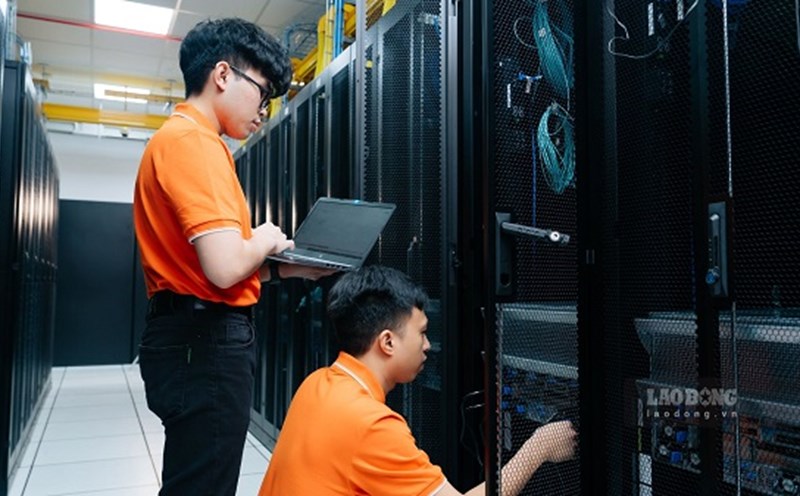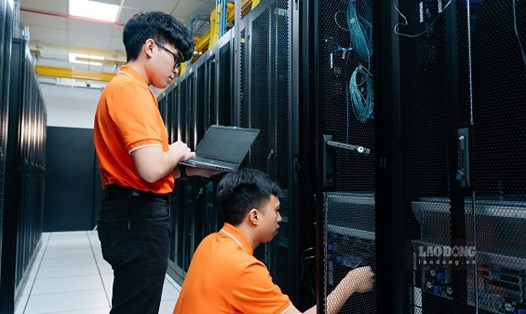This article focuses on the application of AI in feature film production. In the world film industry, the application of AI has become popular and changed the way filmmakers, producers create and even the way audiences are approached.
AI - a powerful assistant in market analysis
It can be said that famous film studios in the world with big names in Hollywood such as: Walt Disney, Warner Bros, Universal Pictures, Paramount Pictures... do not forget to take advantage of the power of AI in market analysis, collecting, analyzing audience data and predicting short-term and long-term market trends.
AI is superior to humans in its ability to work with limitless concentration, never getting tired and almost without errors. AI can work day and night, analyzing millions of audiences, from age, composition to other parameters, evaluating feedback from viewers, to determine the supply and demand of the market, thereby helping producers plan which film trends to follow and marketing strategies.
Even an influential streaming service platform like Netflix (USA) uses AI to advise which content is most suitable for each audience (gender, age...), to increase the number of subscribers, which means increasing revenue.
AI is applied in every stage of film production.
It is no longer unusual for AI to write short paragraphs or draw pictures based on suggestions and data as specific as possible provided by users. But more than that, AI participated in creating the script for the short film “Sunspring” and the movie “Do you love me” in 2016.
Therefore, for filmmakers, AI is truly a "monster" when it can participate in consulting ideas, suggesting plots for each specific topic, with tools such as: ChatGPT, OpenAI Codex, or ScriptBook... AI also actively participates in image design with tools such as DeepFake, Runway, or DALL-E such as the blockbuster "Star Wars: Rogue One", AI is also used to recreate the character Grand Moff Tarkin played by Peter Cushing - a British actor who won the "Best Actor" award at BAFTA in 1956.
Post-production processing of sound and images in films is also improved when AI helps enhance the sharpness of videos/clips, restore old footage, and automate the editing process. This saves both costs and time, especially in documentary projects or remakes of famous works.
AI also actively contributes to PR campaigns, promoting movies from designing posters, producing trailers... to advertising actors and stars in the movie. It is known that Warner Bros. used AI to analyze data and create a trailer for the movie "The Lego Movie 2".
Testing AI with Vietnamese cinema
In Vietnam, the application of AI in cinema is still in its early stages, new and experimental, mainly in the field of post-production and special effects to improve image quality and create special effects for films. It is known that online movie platforms such as Galaxy Play or VieON have also started using AI to suggest content suitable for audience tastes, and advise filmmakers to grasp the real needs of the market.
With major movies, the application of AI is expected to be tested in the near future when some famous directors making commercial films show interest in AI.
The biggest difficulties for Vietnamese cinema are the cost of investing in AI technology and the lack of highly qualified human resources. Applying AI requires a major change in thinking and infrastructure while many directors are still familiar with traditional thinking and filmmaking methods. However, if this opportunity is seized, AI can become a powerful support tool and an extension to bring Vietnamese films to the world, competing with major film industries.
Two sides of the coin
The power of AI in film production is clear. It not only saves time and production costs in many cases, but also improves the quality of films, and creates new tools and new opportunities to satisfy the creative needs of artists.
Certainly in the future, AI will increasingly demonstrate its powerful voice in the production of feature films and from there also raise questions about its negative side.
The emergence of AI will reduce human resources, save costs but will lead to many people fearing unemployment. Remember the strike wave of 11,500 members of the Writers Guild of America in May 2023, to protest low wages for many years and competition with AI that makes their job opportunities and income increasingly difficult.
According to many experts, AI also raises questions about ethics and copyright when it can recreate an actor's image and voice without their consent, or automate too many processes, losing the freshness of creativity that bears the fingerprints and breath of humans.
How to apply AI in the most intelligent way to suitable jobs while still ensuring ethical values to maximize the efficiency of the filmmaking process is not an easy problem. At the same time, each artist needs to use AI as a driving force to enhance creativity, do things that AI cannot or rather cannot do to affirm that nothing can replace sublimation of emotions combined with human intelligence.
The combination of technology and art will create breakthroughs, but ensuring balanced and sustainable development is the long-term goal.











